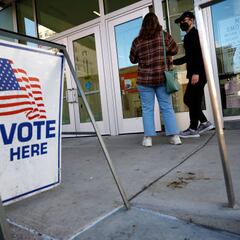2022 Midterm Elections: What states have abortion-related initiatives or measures on the ballot?
The issue of reproductive rights in back on the agenda in the US and five states are giving voters a say on the matter on 8 November.


For nearly 50 years abortion rights were afforded constitutional protections in the United States, enshrined in the landmark 1973 Roe v Wade ruling. But earlier this year the Supreme Court overturned that historic ruling and returned the issue of abortion rights to the states to decide.
US midterm elections live online: Election Day | Latest news
In the first elections since Roe v Wade was struck down, five states are offering residents to opportunity to vote on abortion access this November. That is, perhaps unsurprisingly, the highest number of abortion-related referendums in a single election cycle.
The five states in question are California, Kentucky, Michigan, Montana and Vermont. Here’s what you need to know about abortion on the ballot…
California
Voters will be able to back Proposition 1, which would amend the state constitution to ensure that the state cannot “deny or interfere with” an individual’s “fundamental right to choose to have an abortion and their fundamental right to choose or refuse contraceptives.”
A recent poll found that 69% of voters support the measure so it is expected to pass comfortably and would go into effect five days after the vote is certified by election officials.
Kentucky
At the other end of the spectrum, Kentucky’s Amendment 2 would see the state’s constitution altered to prevent any abortion protections being added. It would go into effect immediately after election certification, if passed.
“To protect human life, nothing in this Constitution shall be construed to secure or protect a right to abortion or require the funding of abortion,” the amendment reads.
Abortion is already illegal in Kentucky from the point of fertilization as a result of a 2019 trigger law, but the constitutional amendment were further enshrine the ban.
Michigan
There is a broader initiative on the ballot in Michigan, where voters are able to cast a vote on the issue of reproductive rights more widely. Proposal 3 would ensure that individuals are afforded the “right to make and effectuate decisions about all matters relating to pregnancy,” which includes abortion, contraception, sterilization, infertility, miscarriage, childbirth and postpartum care.
Montana
Abortion is, and will remain, legal in the state of Montana but Legislative Referendum 131 would broaden the definition of legal personhood to potentially include aborted fetuses. If adopted, the proposal would ensure that “infants born alive, including infants born alive after an abortion, are legal persons” and would have to be treated medically.
Failure to provide adequate medical treatment could be punished with up to 20 years in prison and a $50,000 fine.
Vermont
Related stories
Another state looking to enshrine existing abortion rights in the constitution is Vermont. Proposal 5 would ensure that residents are afforded “personal reproductive autonomy,” in reference to pregnancy, contraceptives and abortion procedures.
Last month a survey found that 75% of respondents support the measure and it will come into effect on Election Day 2022 if passed.

